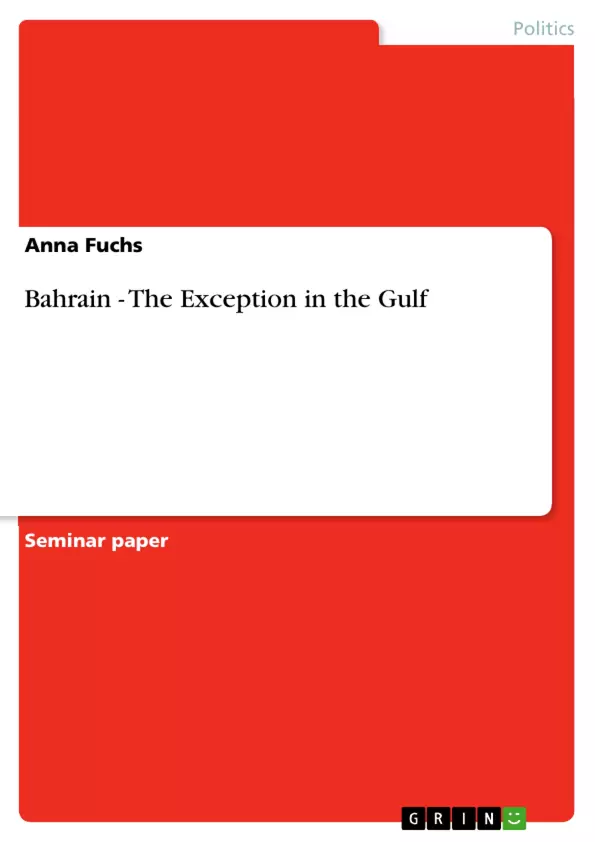Bahrain is one of the countries of the so-called "Arab Spring" but it differs from other revolutionary states: First of all, it is the only one of the six Gulf monarchies in which the existing ruling system was seriously threatened by the demonstrations. Also, the protests as such have a special significance, not only because with up to a hundred thousand people taking it to the streets they were remarkably bigger than the protests in other monarchies, but also because compared to the population, these were probably the biggest demonstrations in the Arab world. Nevertheless, the protests have (up until now) failed.
Inhaltsverzeichnis (Table of Contents)
- Introduction
- The Kingdom of Bahrain
- History
- Political System
- Society
- The Protests
- The National Dialogue
- The Reaction of the International Community
- The Reasons for the Failure of the Revolt
- Elite-Intern Dynamics
- Memory of the Past - Hardliners versus Reformers
- Reluctant Use of Non-Repressive Legitimation Strategies
- Disunity of the Protesters
- Hardliners versus Moderates
- The Crossing of Red Lines
- External Influences
- Pressure of the Gulf Cooperation Council
- International Disinterest in Change
- Elite-Intern Dynamics
- Outlook
Zielsetzung und Themenschwerpunkte (Objectives and Key Themes)
This paper analyzes the reasons for the failure of the 2011-2012 revolt in Bahrain, which was part of the Arab Spring uprisings. The paper argues that the failure of the revolt is due to a combination of internal and external factors.- Internal dynamics within the ruling elite and the opposition
- External pressures from the Gulf Cooperation Council and the international community
- Bahrain's unique historical and social context
- The role of the Shiite majority and the Sunni-led government
- The impact of the Iranian Revolution and the Gulf Cooperation Council's formation on Bahrain's political landscape
Zusammenfassung der Kapitel (Chapter Summaries)
The paper begins by introducing Bahrain as an exception among the Gulf Cooperation Council (GCC) countries due to its majority Shiite population, liberal social norms, and long history of political opposition. The introduction highlights the significance of the 2011 protests in Bahrain, noting that they were larger than those in other GCC monarchies and were unique in threatening the existing ruling system.
Chapter 2 provides a historical overview of Bahrain, tracing its political and social development from the 18th century to the present. The chapter discusses the Al Khalifa family's rule, the discovery of oil, the emergence of a national movement for independence, and the establishment of the GCC. It also explores the ongoing tensions between the Shiite majority and the Sunni-led government, highlighting instances of discrimination and repression.
Chapter 3 examines the 2011 protests in detail, focusing on the National Dialogue and the response of the international community. It explores the various factors that contributed to the protests, including economic inequality, social marginalization, and political repression.
Chapter 4 delves into the reasons for the failure of the revolt. The chapter analyzes the dynamics within the ruling elite, highlighting the division between hardliners and reformers. It also examines the internal divisions within the opposition, contrasting the approaches of hardliners and moderates. The chapter concludes by exploring the role of external influences, specifically the pressure from the GCC and the lack of international support for regime change.
The paper concludes by examining the future outlook for Bahrain, suggesting that the current situation is unlikely to change significantly in the near future. The chapter highlights the ongoing challenges and the potential for further conflict.
Schlüsselwörter (Keywords)
This paper focuses on the political dynamics of Bahrain, particularly the Arab Spring uprisings, the Shiite-Sunni divide, and the role of the Gulf Cooperation Council. The paper examines issues of political repression, social inequality, and the failure of reform efforts. Important themes include the role of the ruling elite, the internal divisions within the opposition, and the influence of external actors.Frequently Asked Questions
Why is Bahrain considered unique among the Gulf monarchies during the Arab Spring?
Bahrain was the only one of the six Gulf monarchies where the ruling system was seriously threatened by massive protests, which involved up to a hundred thousand people—a huge number relative to its population.
What were the main reasons for the failure of the 2011-2012 revolt?
The failure was due to internal dynamics within the ruling elite (hardliners vs. reformers), disunity among protesters (moderates vs. radicals), and external pressures from the Gulf Cooperation Council (GCC).
What role did the Shiite-Sunni divide play in the conflict?
Bahrain has a Shiite majority ruled by a Sunni-led government. This social context has led to long-standing tensions, discrimination, and repression, which fueled the 2011 protests.
How did external actors influence the outcome of the protests?
The Gulf Cooperation Council (GCC) exerted significant pressure to maintain the status quo, while the international community showed a general disinterest in supporting regime change in Bahrain.
What is the historical background of the Al Khalifa family's rule?
The paper traces the Al Khalifa family's rule back to the 18th century and discusses key milestones like the discovery of oil and the movement for independence.
What is the future political outlook for Bahrain according to the paper?
The paper suggests that the current political situation is unlikely to change significantly in the near future, as challenges and potential for conflict remain high.
- Citar trabajo
- Anna Fuchs (Autor), 2012, Bahrain - The Exception in the Gulf, Múnich, GRIN Verlag, https://www.grin.com/document/210628



